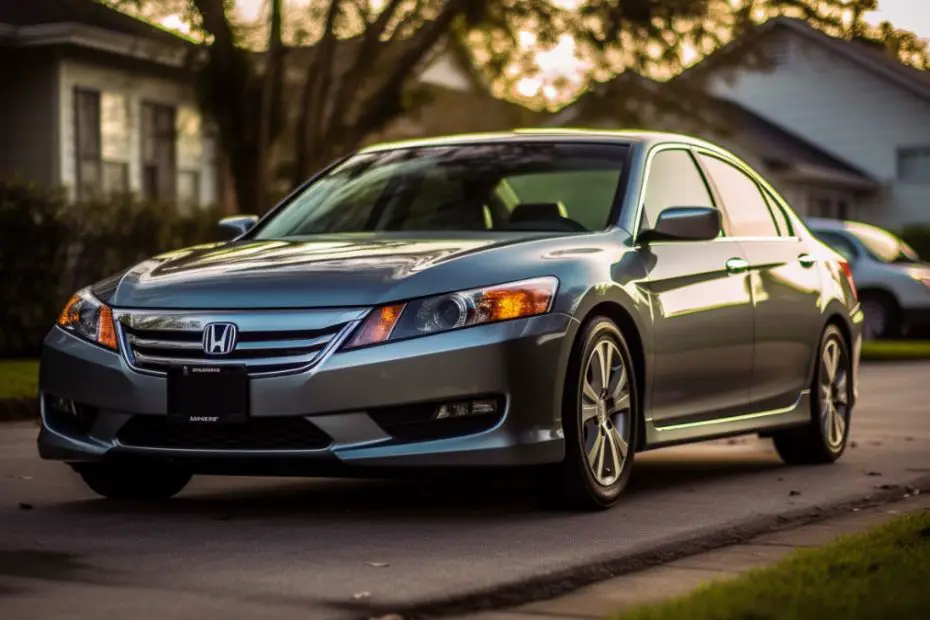A malfunctioning air conditioning (AC) system in your Honda Accord can be frustrating, especially during hot summer days. If you’re experiencing issues with your Honda Accord AC, several potential causes and solutions exist.
So, is your Honda Accord AC not working? If yes, there can be various reasons for AC issues in your Honda Accord, including
- Insufficient refrigerant levels
- A faulty compressor
- Clogged air filters
- Blower motor problems
- Mold or mildew growth, among others.
By understanding these potential causes and following our detailed solutions, you’ll be able to diagnose and fix the issue easily. No more frustration, just effective solutions at your fingertips.
Why Is Your Honda Accord AC Not Working?
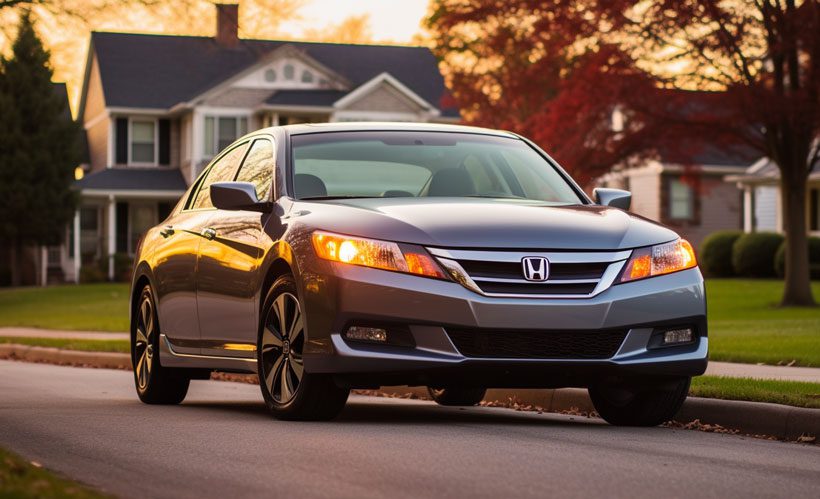
1. Lack of Cool Air
If your Honda Accord’s AC is blowing warm or hot air instead of cool air, there are a few possible reasons to investigate.
Insufficient Refrigerant Levels
One common cause of a lack of cool air is low refrigerant levels in the AC system. Insufficient refrigerant can prevent the AC from producing cold air. To know if you have insufficient refrigerant levels, here are the signs to look out for:
- Lack of cool air even when the AC is turned on
- Air feels warm or slightly cool but not cold
- AC system takes longer to cool the cabin
Solution:
- Start by checking the refrigerant levels in your AC system. You’ll need a pressure gauge designed for automotive AC systems.
- Connect the gauge to the low-pressure service port near the AC compressor.
- Observe the pressure reading on the gauge. If it’s below the recommended range, it indicates low refrigerant levels.
- To address this, take your Honda Accord to a certified technician who can inspect for leaks, repair them if necessary, and recharge the AC system with the correct amount of refrigerant.
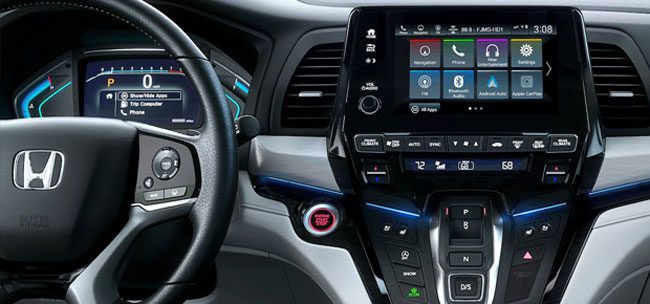
Faulty Compressor
Another culprit could be a malfunctioning AC compressor. The compressor is responsible for pressuring and circulating the refrigerant through the system.
If the compressor fails, it can result in warm air blowing from the vents. That is why knowing the signs of a faulty compressor is essential. They include the following:
- AC blows hot air or no air at all
- Loud noises or unusual sounds coming from the compressor area
- AC system doesn’t respond to temperature or mode adjustments
Solution:
- Listen for any unusual noises coming from the compressor area. It may indicate a faulty compressor if you hear grinding, rattling, or squealing sounds.
- In such cases, it’s best to consult a professional technician to assess the compressor’s condition and determine if it needs repair or replacement.
2. Weak Airflow
If you notice that the airflow from your Honda Accord’s AC vents is weak, the following factors might contribute to the problem.
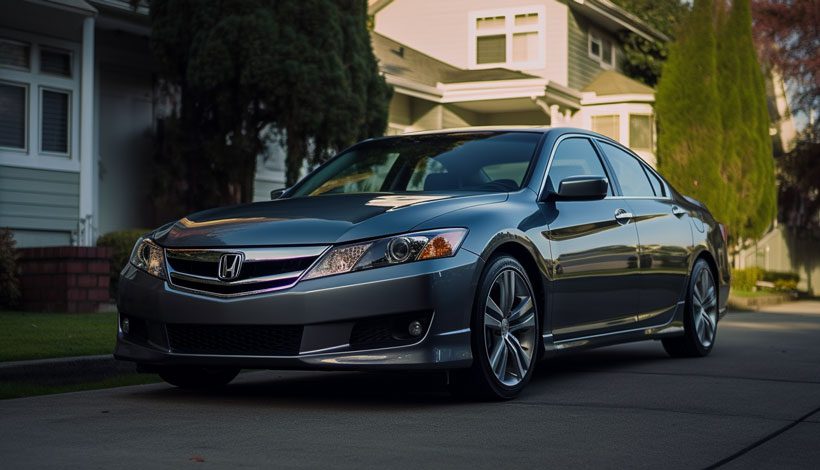
Clogged Air Filters
One of the most common causes of weak airflow is dirty or clogged air filters. Over time, dust and debris can accumulate in the filters, hindering proper airflow. To be able to nub this problem in the bud, here are the signs to look out for:
- Reduced airflow from the vents
- AC system takes longer to cool the cabin
- Dusty or musty smell when the AC is turned on
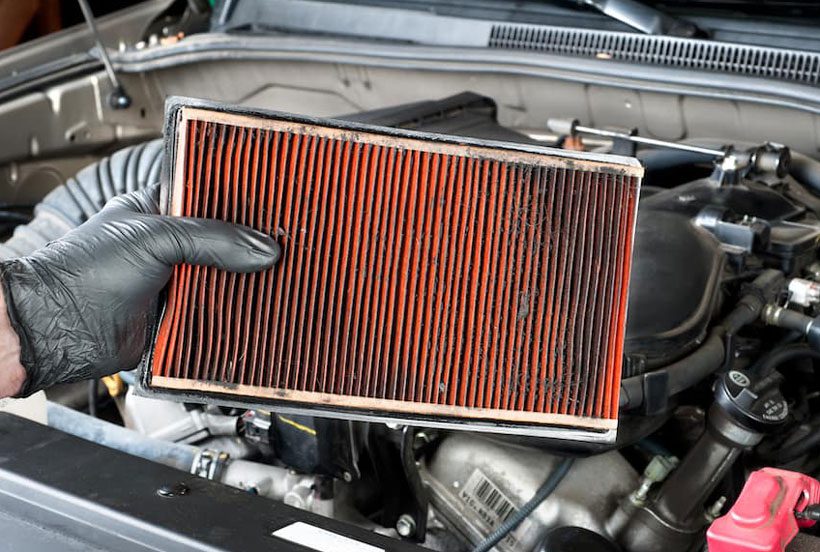
Solution:
- Locate the air filters in your Honda Accord. They are usually located behind the glove compartment or under the hood.
- Remove the air filters and look for debris, dirt, or dust. If you notice that they are either dirty or blocked, clean them if they are reusable or replace them.
- To replace them, open the housing: Remove the fasteners or clips securing the housing and carefully open it to access the old cabin air filter.
- Remove the old filter: Take out the old cabin air filter from the housing, paying attention to its orientation to properly install the new filter.
- Clean the filter housing: Thoroughly clean the filter housing, removing any debris or dust that may have accumulated.
- Install the new filter: Place the new cabin air filter into the housing, ensuring it is properly aligned and fits securely.
- Close the housing: Close the housing and reattach the fasteners or clips to secure it in place.
Blower Motor Issues
A faulty blower motor might also result in poor airflow. The blower motor is in charge of forcing air through the vents. It may not offer enough power to circulate air adequately if it fails. A professional check is advised to determine whether the blower motor needs to be repaired or replaced.
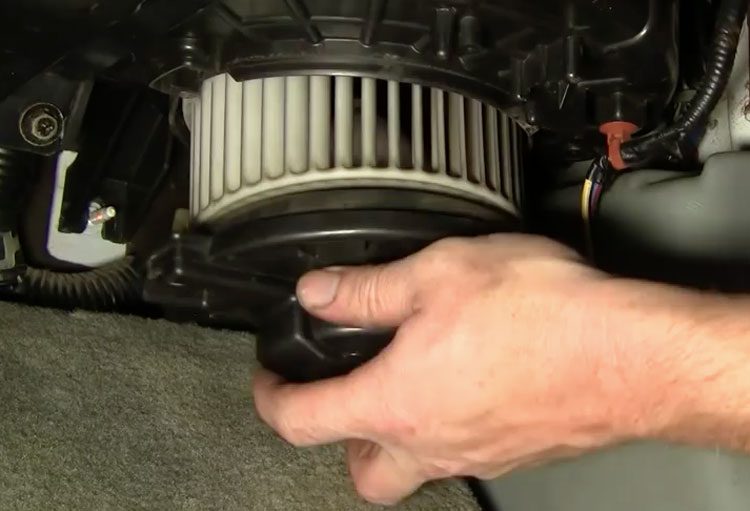
Here are the signs of your blower motor malfunctioning:
- Very weak or no airflow from the vents
- Inconsistent airflow
- Unusual noises coming from the blower motor area
The Fix:
- Disconnect the battery: Turn off the engine and disconnect the negative (-) battery cable to ensure safety during the replacement.
- Remove the blower motor housing: Locate the housing behind the glove compartment or under the dashboard, remove the screws or bolts, and disconnect any electrical connectors.
- Extract the faulty blower motor: Gently pull out the old one from the housing, noting its position for installation.
- Install the new blower motor: Correctly position the replacement motor, which costs an average of $550, in the housing and reconnect the electrical connectors.
- Reassemble the blower motor housing: Secure the housing back in place using the screws or bolts.
- Reconnect the battery: Reconnect the negative (-) battery cable that was previously disconnected to restore power.
3. Unpleasant Odors
If unpleasant odors emanate from your Honda Accord’s AC system, it can significantly impact your driving experience. Here are a couple of reasons why this might occur.
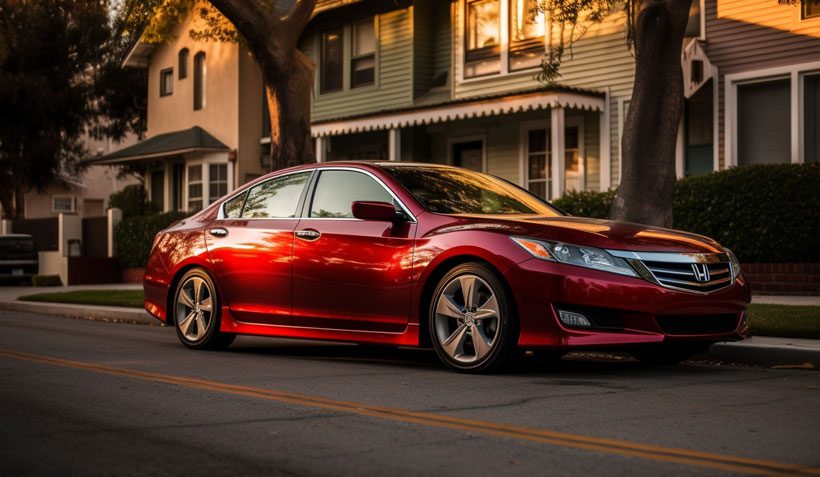
Mildew/Mold Growth
Mildew or mold growth can be encouraged when moisture accumulates in the AC system.
When the AC is turned on, this can cause unpleasant odors to be produced. To eliminate mold or mildew and erase the stench, the AC system must be thoroughly cleaned, including the evaporator and ventilation ducts.
Dirty Cabin Air Filter
The cabin air filter filters the air into the passenger compartment and can become dirty over time. A dirty cabin air filter can emit unpleasant odors when the AC is turned on.
Here is how to tell if you have a dirty cabin air filter:
- Allergies or respiratory issues worsening while using the AC
- Dust or debris visible on the cabin air filter
- Reduced airflow or weak ventilation in the cabin
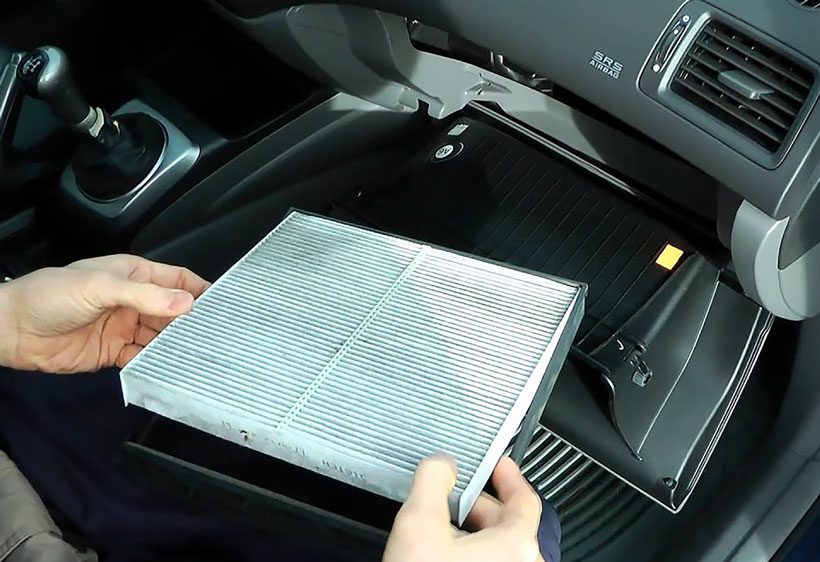
The Fix:
- Gather the necessary supplies: Gather the following supplies: AC system cleaner, screwdriver (if necessary), cleaning brush or soft cloth, a vacuum cleaner with a hose attachment, protective gloves, and safety goggles.
- Locate the AC components: Identify the key components of your Honda Accord’s AC system, such as the evaporator, ventilation ducts, and cabin air filter. Refer to your owner’s manual if needed.
- Turn off the AC system: Turn off the AC system and shut down the engine before cleaning.
- Clean the evaporator: Access the evaporator, remove any covering or access panels and spray AC system cleaner onto the fins and coils. Follow product instructions and let the cleaner sit for the recommended time.
- Clean the ventilation ducts: Use a vacuum cleaner with a hose attachment to clean ventilation ducts, inserting the hose and moving it back and forth for thorough cleaning. Use a cleaning brush or soft cloth for hard-to-reach areas.
- Inspect and replace the cabin air filter: Inspect it for dirt or contamination, and replace it if necessary. Follow the solution above for the correct installation.
- Reassemble and test: Reassemble any removed components, ensuring they are securely in place. Turn on the AC system and test for cool air, proper functionality, and the absence of unusual noises or odors. Consult a professional technician if issues persist.
- AC System Not Turning On
If your Honda Accord’s AC system doesn’t turn on, there are a few potential causes to look into.
Electrical Issues
Electrical problems, such as a blown fuse or a faulty relay, can prevent the AC system from turning on. Checking the fuses and relays related to the AC system in the Accord’s fuse box is a good starting point.
If any of these components are damaged, replacing them should restore the functionality of your AC system.
So, mitigating these electrical issues earlier is essential. Here are the signs of your AC having electrical issues:
- AC system fails to respond to controls or buttons
- Blown fuse related to the AC system
- Issues with other electrical components, such as relays or wiring
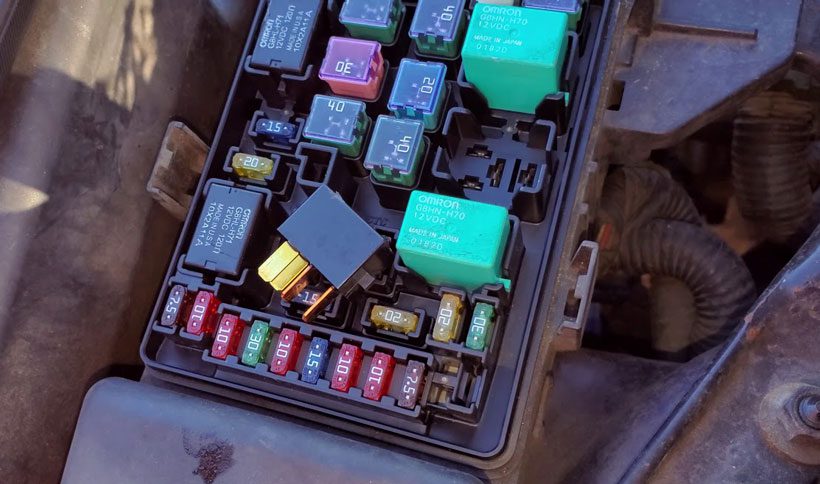
Solution:
- Start by checking the fuses related to the AC system. Locate the fuse box under the dashboard or in the engine compartment. Use the fuse diagram on the box cover or your owner’s manual to identify the AC system-related fuses.
- Remove the AC system-related fuses and inspect them for signs of damage, such as a blown fuse or a discolored element. If any fuse appears damaged or blown, replace it with a new fuse of the same rating.
- Using a pair of needle-nose pliers or a fuse puller tool (if provided in your vehicle’s fuse box), carefully grip the blown fuse and gently pull it straight out from its socket. Avoid using excessive force or twisting the fuse.
- Inspect the blown fuse visually to confirm that the metal filament is broken or burnt. This indicates that the fuse has blown and needs to be replaced.
- Choose a replacement fuse with the same amperage rating as the blown fuse. It’s crucial to match the amperage precisely to ensure proper electrical protection.
- Insert the replacement fuse into the corresponding socket, aligning the prongs with the socket’s slots. Ensure it is fully seated and secured in place.
- Turn on your Honda Accord’s ignition and test the AC system to check if it is functioning properly. If the system operates without any issues, the fuse replacement was successful.
- Once you’ve confirmed that the AC system is working, close the fuse box cover securely, ensuring it is properly latched.
Faulty Control Panel
In some cases, a malfunctioning control panel can be the reason behind the AC system not turning on. The control panel houses the buttons and controls for the AC; if it fails, it can render the AC inoperable. The following are ways to tell if your control panel is faulty:
- No response from the AC controls on the control panel
- Inconsistent or erratic behavior of the AC controls
- Other functions on the control panel function properly

Solution:
It is generally advisable to consult a professional if the control panel of your Honda Accord’s AC system is malfunctioning.
The control panel is a crucial component that regulates the operation of the AC system, and attempting to fix it without proper knowledge and expertise can potentially cause further damage or complications.
A professional technician specializing in automotive electrical systems will have the necessary diagnostic tools and experience to accurately identify and address the specific issue with the control panel. They can determine if the problem can be repaired or if a replacement is needed.
If you’re experiencing issues with your Honda Accord’s AC, you may also find our article on how to reset the wrench light on Honda Civic helpful. This guide provides step-by-step instructions for resetting the wrench light, which can help address various issues in your Honda Civic. Additionally, if you’re facing problems with the electric parking brake in your Honda Civic, our article on Honda Civic electric parking brake problem explores the causes and potential solutions for this specific issue.FAQs
Here are a few more additional questions you may be interested in.
Automobile AC system cleaners can help eliminate mold, mildew, and odors. Follow the product instructions carefully and use cleaners recommended explicitly for your car AC system.
No, there have been no recalls specifically made for the AC systems of the Honda Accord. This means that the AC systems in the Honda Accord are built to last you a long time.
Sometimes, a control panel reset may resolve minor issues. Consult your vehicle’s owner’s manual for instructions on how to perform a control panel reset. If the problem persists, seek professional assistance.
Conclusion
Experiencing issues with your Honda Accord AC not working can be frustrating, especially during hot weather or long drives. Whether addressing a lack of cool air, weak airflow, unpleasant odors, or the AC system not turning on, taking the necessary steps will help you regain control over your Honda Accord’s AC system.
Remember to start with simple checks, such as inspecting refrigerant levels, cleaning or replacing air filters, and examining the blower motor. If the problem persists or you need more clarification about any step, it’s always recommended to consult a certified technician.
